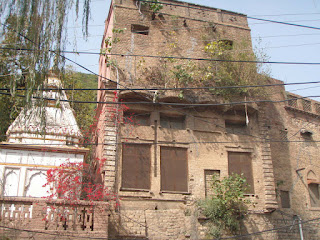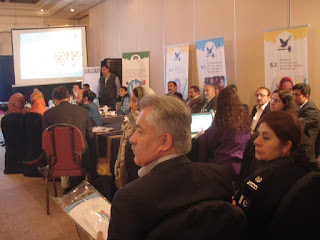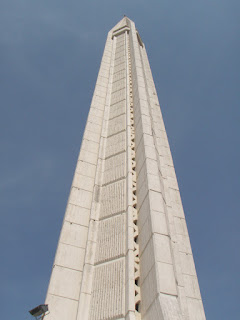I was invited to Islamabad for a national conference/workshop on how to establish multidisciplinary response to child abuse and neglect. After a full day exploring the surroundings of Islamabad, today is Day 1 of the workshop. Pakistan finally is moving toward a systemic response to child
protection issues with the support from UNICEF. Farrah Ilyas, the Child Protection
Specialist in UNICEF Pakistan gives the most impressive speech throughout the
morning. What is interesting is that there are many female leaders running the
show including the actual leaders of this two-province piloting of systems response to child abuse and neglect, who are barely in their late 30s, early 40s. UNICEF Pakistan staff also overwhelmingly consists of women, bright,
well-educated, modest but confident. I feel very close to these women.
The child abuse workshop Pakistani government organized in collaboration with UNICEF and other UK originated organizations
And the males that present their support on the first
morning panel are also good people after my own heart. They are clearly
progressive men, respecting women, feeling for children, and dedicated to child
protection. As a result of this collaborative work, these men and women of Balochistan
and Gilgit Baltistan provinces, two most rural and conservative provinces of
the country, passed legislation mandating their provincial governments to
create management and referral systems for their abused and neglected children. I
am so glad I considered coming to Pakistan a second time. With these dedicated
bright Pakistani people, I trust, child protection system will change in
Pakistan sooner or later.
Farrah from Unicef Pakistan is giving her impressive talk when the rest is attentively listening: Notice half of speakers are women
Farrah, a competent, open minded, most attractive Pakistani
female child protection specialist from UNICEF explains to us beautifully that
each of these provinces has passed legislation fully in concert with Article
19, child protection article of the UN Convention on the Rights of Child. It is
great news that both provinces have established a child protection commission
with local extensions in towns. This is exactly the way I had dreamed it would
have happened in Turkey with the Inter-ministerial Higher Council of 2010 and
its provincial child abuse councils. Unfortunately, the central council pretty
much disappeared over time and the provincial councils became dormant in the
last 5-6 years. I hope that doesn’t happen in Pakistan.
A scene from Day 2 of the workshop
Professor Gini and I cover complementary components of the
larger project UNICEF and Oxford Policy Management group that provide Pakistani
stakeholders technical assistance have been envisioning. It is a win win, in my
mind. Although, politicians that own this pilot project’s public responsibility
leave shortly after the first morning panel, those that remain clearly have been and will continue to be the
on-the-ground engine of this project, which I will appreciate even better the second
day. So, all is good. Before and after my lecture, I learn more and more about
the nitty gritty of what is being envisioned for this pilot project. And I like
what I learn and what is being planned.
The lady in the center is a Senator from the federal Pakistani government responsible for information systems in Pakistan
Anyway, this attractive woman also has her lips rouged with
bright red lipstick and evocative eye liner that make her eyes all the more
attractive. She is not alone in how she makes up her face; those Pakistani women,
who don’t mind exposing their face to the outside world are all very bold in
how they use make up. Just like their senator, they don’t shy away from bold
colors, in fact that is what they wear almost exclusively. Not only their make
up, their clothes included. The most
colorful silk, chiffon, satin dresses they wear is song to the soul, especially
when you think of the most traditional women, who are confined into their pitch black
chadors… When I admire vocally, one of the workshop attendees with her outfit’s bright,
cheerful colors, she tells me coquettishly “Why not? blues and grays are for
men, right?” I want to give her a hug for this subtly rebellious standing her
ground with her colors…
A young, more modern woman from Day 2 of the workshop
The second day of the workshop is even more impressive,
which allows me learn Pakistani panorama of work force, culture, the role
religion plays in the society, women’s role in this post-Benazir Bhutto
Pakistan, resilience and brilliance of Pakistani professionals. There is one woman, who is covered with almost
one piece of cloth from head to toe only exposing her eyes and hands to the
outside world. She surprises me the most; when it is her turn to tell the group
what she took from day 1 in a sentence, she gives a mini speech, with the most
confident and competent sounding voice and composure underneath that cloth.
One of the smartest leaders from day 2 turns out to be the woman in orange attire with only her eyes exposed, but she surely was very effective
Although I don’t understand what she states since she speaks in Urdu, I can tell she is one tough cookie. Then I bump into her in the bathroom. She has let the head piece of her garment down. Her face including her eyes has no make-up. We chat a bit in English, I understand she knows what she is talking about and she makes a lot of sense. I can’t help wondering how it is that, I can appreciate all these men and women from various levels of conservativeness and liberation and feel at peace with working with any and every one of them toward our purpose of protecting children, but that I have to struggle moving beyond all kinds of biases when I encounter similar men and women in Turkey.
Some of the attendees, men and women, clearly come from a different and more secular cultural background
I have to give credit to myself that I don't know what type of political games are being played under the surface among these people, whereas I see the dirty tricks in Turkey very easily. I know, I won’t find the answer to this question right this trip let alone the solution to my bias in the short term. But, I have a feeling, my encounters in Pakistan will help me move beyond my difficulty with Islam and devout Muslims.
One of the smartest leaders from day 2 turns out to be the woman in orange attire with only her eyes exposed, but she surely was very effective
Although I don’t understand what she states since she speaks in Urdu, I can tell she is one tough cookie. Then I bump into her in the bathroom. She has let the head piece of her garment down. Her face including her eyes has no make-up. We chat a bit in English, I understand she knows what she is talking about and she makes a lot of sense. I can’t help wondering how it is that, I can appreciate all these men and women from various levels of conservativeness and liberation and feel at peace with working with any and every one of them toward our purpose of protecting children, but that I have to struggle moving beyond all kinds of biases when I encounter similar men and women in Turkey.
Some of the attendees, men and women, clearly come from a different and more secular cultural background
I have to give credit to myself that I don't know what type of political games are being played under the surface among these people, whereas I see the dirty tricks in Turkey very easily. I know, I won’t find the answer to this question right this trip let alone the solution to my bias in the short term. But, I have a feeling, my encounters in Pakistan will help me move beyond my difficulty with Islam and devout Muslims.
Equanimity allows to avoid grasping on certain things and rejecting others
What have I learned during this trip? One more time I bow
before the Buddhist teaching of equanimity. Pakistan, even its smallest
provinces are full of brilliant minds, who are dedicated to the ultimate good
in the universe, burning with the desire to protect and provide for children
and families, see what is good, what is missing, build on partially
existing systems and experiences to implement a true child protection system in
their provinces to lead the way for the other provinces in the country.
I was impressed with so many things about Pakistani culture
and society during my first trip to Pakistan last November through Lahore,
which is multiplied exponentially during this trip. First and foremost, there
is so much diversity in Pakistan, I didn’t know existed. It is very unfair to
Pakistan that the West is constantly beating the drum of Pakistan harboring
terrorism and not being a safe place to visit. If there is any terrorism, it is definitely a small issue in the
periphery of current Pakistani existence, affecting a relatively small portion
of the society in their day-to-day dealings.
Internet informs that terrorist activities are relatively common, it surely didn't feel that way...
Pakistani professionals co-exist in a wide panorama of
political, cultural, religious preferences and alliances. Some are totally
secular from their attire to thinking and acting one can easily tell once they
enter a space and especially when they start expressing themselves. Some are
more traditional in their attire, and perhaps what they believe in and how they
live their day-to-day lives. But when it comes to child protection issues, they
are right where the most secular ones are at. Then some clearly abide by the
rules and regulations of Islam to the T; they start their comments with Islamic
greetings such as “Bismillahirrahmanirrahim, Esselamunaleykum”, their attire is
close to burka for women, and replete with other Islamic indicators for men.
Yet, once again, when child protection issues are at stake, they embrace the
same facts and truths and point to similar solutions as the rest of the group. How remarkable...
Why doesn’t this happen in Turkey? The Ministry of Health
and other governmental structures have implemented the Child Protection Center
model under the scientific guidance of a collaboration that I was a part of.
However, although short-staffed, they refused to integrate the university based
child protection centers to the network of 30 plus child protection centers the
Ministry of Health has established; just because the government sees
universities in Turkey as a threat to their Islamist agenda.
Closing ceremony of the Child Rights Conference in 2017
This rejection of the expertise of the progressive, secular academics, with whom I worked for years then sent the universities to establish a system parallel to what the government established, but without the efficacy at least on clinical arena that the governmental network has. I hope the newly established Child Protection Commission will fix this disconnect between governmental centers and academic centers in Turkey, although there is little evidence that they are moving toward that direction.
Closing ceremony of the Child Rights Conference in 2017
This rejection of the expertise of the progressive, secular academics, with whom I worked for years then sent the universities to establish a system parallel to what the government established, but without the efficacy at least on clinical arena that the governmental network has. I hope the newly established Child Protection Commission will fix this disconnect between governmental centers and academic centers in Turkey, although there is little evidence that they are moving toward that direction.
Islamabad is beautifully surrounded by high mountains
At the end of the workshop in Islamabad, front line administrators and
child protection and education workers were divided into three groups to work
on multiple questions that UNICEF and Oxford Policy Management group had
generated for them. Once, the report of the first group was being shared with
the larger group, I couldn’t help but feeling goose bumps all over my body.
This group of colleagues, who very humbly mentioned in the morning that my
lecture and its content were an eye opener for them from day I, are in fact in
their report, listing what I would have taught any novice group embarking on a
brand new child protection project.
If only we could all reach equanimity under any circumstances
“They are my equals”, the only difference between them and I
is that the universe gave me more resources and opportunities to learn and
explore; nothing more. We are speaking the same language, thinking about what
Pakistan needs to tackle this task in very similar ways, and their plan of
action has very few missing pieces that I might want to share with them at the
end. The second reporter fills in a few more of the gaps the first one left.
The third one weaves in more of what I’d like to share with them.
One of the minarets of Shah Faisal Mosque piercing the sky
I now feel no more than a participant in this huge and
impressive work to be done in Pakistan, one who is more than willing to walk
with them hand in hand until the mission is accomplished, sometimes by
traveling to Pakistan, mostly via webinars. I share with them my feelings,
willingness to work together until they are fulfilled with what they will be
soon creating. My heart and mind are full of positive, equanimeous, loving,
kind energy; I can see my words, instill in them, the same. Faces light up in
some with a shy smile, in some with the easing of somewhat tense facial lines,
in some with approving and appreciative nodding… Eyes are full of confidence,
that wisdom of knowing oneself, yet with validation from a trusted person
deepening that knowing…
The Hindu Temple in Saidpur, a small village near Islamabad
I know this experience. I’ve seen audiences starting novel
child protection work in Turkey, Colombia, Greece, Portugal among others with
the same knowing wisdom but still questioning the feasibility of what they
aspire to. I’ve seen the transformation of such subtle ambivalence and sense of
uncertainty to feeling grounded, to trusting their inner wisdom and
understanding, to feeling ready to leap forward. That’s where I left some 50
pioneers from Balochistan and Gilgit Baltistan provinces of Pakistan today.
With phenomenal policy management, child protection technical assistance
capacities and expertise that UNICEF and OPM organizations are willing and
ready to provide to this brilliant group of people, I have no doubt that
Pakistan is in the making of a transformed country in terms of how they will
soon start responding to child protection issues. May you all find the strength and support you need in your efforts my dear friends...
 |
| Life springs off and out of anything and everything in Pakistan like these walls growing trees and bushes! |
















No comments:
Post a Comment